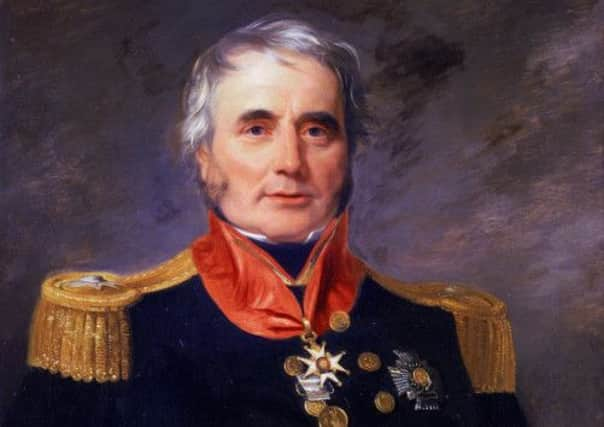Horatio Hornblower ‘based on Scots admiral’


Hornblower, the swashbuckling hero in the C.S. Forester adventure novel, has for years been portrayed as a dashing English sailor.
But now maritime historian, Bryan Perrett, believes he has proved that the character was based on Aberdonian admiral James Gordon.
Advertisement
Hide AdIt has been previously believed that Gordon was one of a number of great naval officers, around the time of the Napoleonic Wars, that Hornblower could have been based on.
Since the character made his debut in the 1937 novel The Happy Return, there’s been debate among fans as to who he might have been modelled on.
But Mr Perrett believes he’s finally solved the mystery, saying Gordon’s life mirrors the character more than any other.
In his book, The Real Hornblower, he argues that Gordon, who went from a humble boy seaman to an admiral during a remarkable career, was the real inspiration for Hornblower.
Gordon was involved in some of the most famous naval battles of the Napoleonic era.
Mr Perrett said: “It was interesting to speculate as to which of Hornblower’s adventures were based on real events, and whether these involved the same officer or were simply samples from a selection of distinguished careers.”
Advertisement
Hide AdHe chanced upon the answer while researching a little-known naval engagement during the War of 1812, fought between Britain and the United States.
Two years into the conflict, a small force of Royal Navy warships sailed up the Potomac river and deep into enemy territory to carry out a raid on the strategically important town of Alexandria near Washington.
Advertisement
Hide AdMr Perrett immediately recognised the exploit as being virtually, identical to one featured in the Hornblower story The Commodore, published in 1945, although Forester changed the location to the Baltic and the enemy to the French.
He discovered that the Potomac squadron’s commander was Commodore James Gordon, who had seen more than his share of battle and sudden death.
The author said: “The Potomac venture apart, there had been fights against odds, hard-fought singles-hip actions, cutting-out expeditions and landings on enemy coasts.”
The more Mr Perrett dug into Gordon’s life, the more he was struck by the similarities between the Scotsman and Forester’s fictional hero.
He said: “With a growing sense of deja vu, I realised that I was already familiar with several episodes in Gordon’s career and that such familiarity could only have stemmed from the Hornblower cycle.
“There were some incidents in Hornblower’s story which reflected the achievements of officers other than Gordon, but it is Gordon’s life which bears the greatest similarity to Hornblower’s.
Advertisement
Hide Ad“Nor do I believe it is simple coincidence that Hornblower’s command in The Happy Return was named Lydia, which also happened to be the name of Gordon’s wife.”
The grandson of a Jacobite who fought at Culloden, James Alexander Gordon was born in Aberdeen in 1782 and joined the Royal Navy aged just 11.
Advertisement
Hide AdAt 21 he was given command of his first ship HMS Racoon, seeing action in the West Indies, America, the Mediterranean and the Adriatic, where he lost a leg to a French cannonball in a battle off the Dalmatian coast in 1808.
Knighted the same year, Gordon was awarded the Freedom of the City of Aberdeen in 1818 and ended his career as an Admiral of the Fleet, serving as governor of the Royal Naval Hospital at Greenwich, a rest home for elderly and infirm sailors.
After a career spanning an astonishing 76 years, he died aged 87 in 1869, still a serving officer, and was buried in the grounds of the Royal Naval Hospital.
The Hornblower stories were adapted into a hit TV series in the 1990s starring Welsh actor Ioan Gruffudd.
Mr Perrett said: “It became part of Gordon’s legacy that, while largely forgotten himself, he should contribute so much to the fictional Hornblower’s life.”